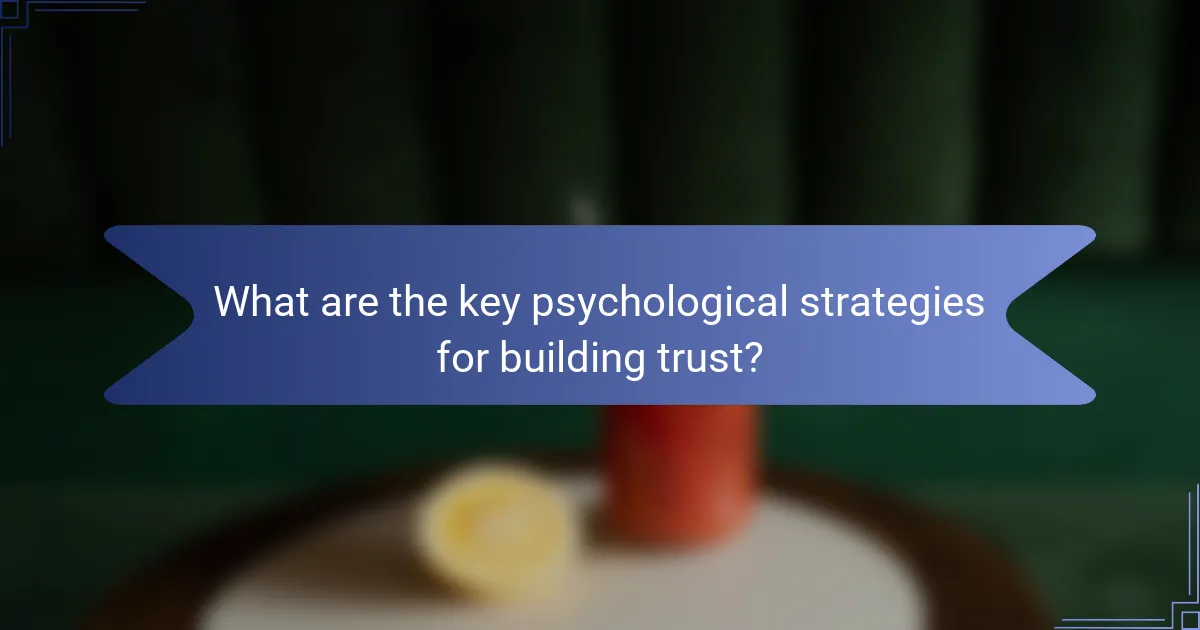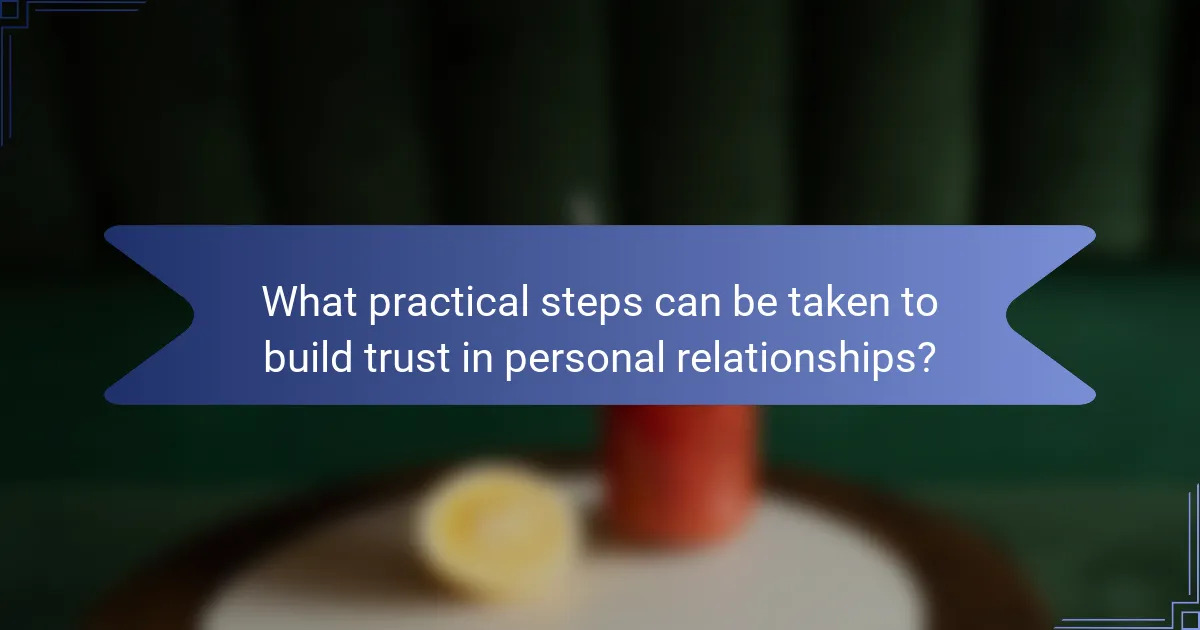Building trust is essential for personal growth and development. Focus on key psychological strategies such as consistency, transparency, and active listening. These elements foster reliable relationships, enhance communication, and deepen emotional connections. By practicing these strategies, you can create a strong foundation of trust in your interpersonal interactions.

What are the key psychological strategies for building trust?
To build trust, focus on psychological strategies such as consistency, transparency, and active listening. Consistency in actions and words fosters reliability, while transparency encourages open communication. Active listening demonstrates respect and understanding, enhancing relational bonds. These strategies contribute to personal growth and development by creating a foundation of trust in interpersonal connections.
How does trust impact personal growth and development?
Trust significantly enhances personal growth and development by fostering secure relationships and encouraging vulnerability. It creates an environment where individuals feel safe to explore their potential. Trust promotes open communication, leading to better feedback and collaboration. As a result, people are more willing to take risks and embrace new challenges, essential for personal development. Research indicates that trust also correlates with increased resilience and emotional intelligence, both critical for navigating life’s complexities.
What role does emotional intelligence play in establishing trust?
Emotional intelligence is crucial for establishing trust as it fosters understanding and empathy. High emotional intelligence enables individuals to recognize and manage their own emotions while empathizing with others. This connection enhances communication, reduces misunderstandings, and builds rapport. As a result, trust develops more readily in relationships characterized by emotional awareness and responsiveness.
Which psychological theories support trust-building?
Psychological theories such as Social Exchange Theory, Attachment Theory, and the Trust Equation support trust-building. Social Exchange Theory emphasizes the cost-benefit analysis in relationships, suggesting that trust develops when perceived benefits outweigh costs. Attachment Theory highlights the importance of early relationships in shaping trust behaviors, indicating that secure attachments foster trust in later interactions. The Trust Equation posits that trust is a function of credibility, reliability, intimacy, and self-orientation, illustrating how these factors interact to build or erode trust over time.
How does the Social Exchange Theory explain trust?
Social Exchange Theory explains that trust arises from perceived benefits in relationships. Trust is built when individuals feel that their contributions will be reciprocated, fostering a sense of reliability and safety. This theory emphasizes the importance of mutual benefit, where individuals weigh the costs and rewards of interactions. As a result, trust becomes a critical factor in personal growth and development, influencing how relationships are formed and maintained.
What insights does Attachment Theory provide on trust?
Attachment Theory highlights that trust is built through secure attachments formed in early relationships. These secure attachments foster emotional safety, enabling individuals to trust themselves and others. Research indicates that people with secure attachment styles exhibit higher levels of trust and relationship satisfaction. In contrast, insecure attachments often lead to distrust and relationship challenges. Understanding these dynamics can enhance personal growth by encouraging healthier relational patterns.

What are the universal attributes of trust-building?
Building trust universally involves transparency, consistency, empathy, and reliability. These attributes foster stronger connections and enhance interpersonal relationships. Transparency ensures open communication, allowing individuals to share thoughts freely. Consistency builds predictability, making interactions more secure. Empathy promotes understanding, creating a supportive environment. Reliability reinforces trust through dependable actions. Each attribute plays a crucial role in establishing and maintaining trust over time.
How do communication skills enhance trust?
Effective communication skills significantly enhance trust by fostering transparency and understanding. When individuals articulate their thoughts clearly, it reduces ambiguity and builds confidence in their intentions. Active listening, a key component of communication, allows people to feel heard and valued, further solidifying trust.
Moreover, consistent communication reinforces reliability, as it demonstrates commitment to maintaining open dialogue. As a result, relationships flourish in environments where trust is prioritized, leading to deeper connections and collaboration. In essence, strong communication acts as a foundation for trust, enabling personal growth and development.
What is the significance of consistency in trust?
Consistency is crucial for building trust because it establishes reliability and predictability in relationships. When individuals demonstrate consistent behavior, they create a foundation for others to feel secure and confident in their interactions. This psychological strategy fosters a sense of safety, encouraging open communication and deeper connections. As a result, trust develops more effectively, leading to enhanced personal growth and development.
How does vulnerability contribute to trust?
Vulnerability fosters trust by creating an environment of openness and authenticity. When individuals share their fears and insecurities, it encourages reciprocal sharing, thus deepening connections. This process enhances emotional safety, which is essential for building strong relationships. Research indicates that vulnerability can lead to increased interpersonal trust, as it signals honesty and reliability.

What unique attributes differentiate effective trust-building?
Effective trust-building is differentiated by transparency, consistency, empathy, and active listening. Transparency fosters openness, allowing individuals to feel secure. Consistency in actions reinforces reliability, while empathy builds emotional connections. Active listening demonstrates genuine interest, further enhancing trust. These unique attributes collectively create a strong foundation for lasting relationships.
How can active listening foster deeper trust?
Active listening fosters deeper trust by demonstrating genuine empathy and understanding. When individuals feel heard, they are more likely to open up and share their thoughts and feelings. This creates a safe environment that encourages vulnerability, which is essential for building trust. Active listening involves not just hearing words but also interpreting emotions and intentions behind them. As a result, relationships deepen, and mutual respect grows. Employing this technique consistently can lead to stronger personal connections and enhanced collaboration.
What is the impact of transparency on trust levels?
Transparency significantly enhances trust levels by fostering open communication and accountability. When individuals or organizations share information candidly, it reduces uncertainty and builds confidence in their intentions. This openness is a unique attribute that directly correlates with psychological safety, encouraging deeper relationships. As a result, trust is cultivated, leading to stronger personal growth and development.

What rare attributes can significantly enhance trust-building?
Transparency, consistency, and authenticity are rare attributes that can significantly enhance trust-building. Transparency involves open communication about intentions and decisions, fostering an environment of honesty. Consistency refers to reliable behavior over time, reinforcing predictability in relationships. Authenticity means being genuine and true to one’s values, which resonates deeply with others, creating stronger bonds.
How does empathy uniquely influence trust dynamics?
Empathy significantly enhances trust dynamics by fostering deeper connections and understanding. When individuals express empathy, they demonstrate a willingness to recognize and validate the feelings of others, which builds a foundation of trust. Empirical studies show that empathetic interactions lead to increased cooperation and reduced conflict, essential elements for personal growth and development. This unique attribute of empathy creates an environment where open communication flourishes, further solidifying trust among individuals.
What are the effects of shared experiences on trust?
Shared experiences significantly enhance trust by creating emotional bonds and fostering mutual understanding. These interactions allow individuals to relate to one another, leading to increased empathy and reliability. As a result, shared experiences often lead to stronger interpersonal connections, which are essential for personal growth and development. Research indicates that engaging in activities together can amplify feelings of trustworthiness, as individuals perceive each other as allies rather than adversaries. This unique attribute of shared experiences is crucial in building a foundation of trust that supports long-term relationships.

What practical steps can be taken to build trust in personal relationships?
Building trust in personal relationships requires consistent actions and openness. Start by practicing active listening, which shows you value the other person’s thoughts. Maintain transparency by sharing your feelings and intentions, fostering a sense of safety. Follow through on commitments to demonstrate reliability, as this reinforces your integrity. Lastly, engage in vulnerability by sharing personal experiences, which can deepen emotional connections and trust.
What common mistakes should be avoided in trust-building?
To build trust effectively, avoid common mistakes such as inconsistency, lack of transparency, and failure to listen. Inconsistency undermines credibility, while transparency fosters openness. Listening builds rapport and shows empathy, essential for trust.
How can one measure the level of trust in relationships?
To measure the level of trust in relationships, observe communication patterns, reliability, and emotional support. Trust can be assessed through consistent behavior, openness in discussions, and mutual respect. Additionally, consider self-reported trust levels through surveys or direct conversations. These methods provide insights into the strength of trust within the relationship.
What are best practices for maintaining trust over time?
Building trust requires consistent actions and transparent communication. Best practices include actively listening, delivering on promises, and being honest about mistakes. Regular check-ins and feedback enhance relationships over time. Additionally, showing empathy fosters deeper connections, reinforcing trust.
How can trust-building strategies be adapted for different contexts?
Trust-building strategies must be tailored to fit specific contexts, such as personal relationships, workplace environments, or community interactions. Understanding the unique attributes of each context enhances the effectiveness of these strategies. For example, in personal relationships, transparency and vulnerability are crucial. In contrast, in professional settings, consistency and reliability are key. Adapting to the audience’s needs and expectations fosters stronger connections. As a result, trust can be cultivated effectively across diverse situations.